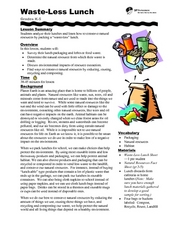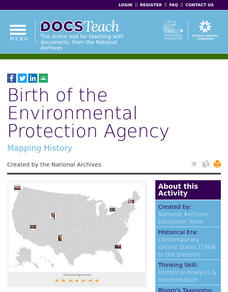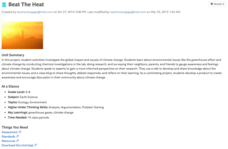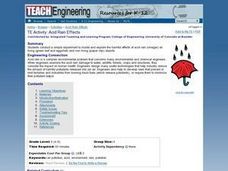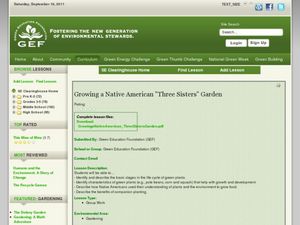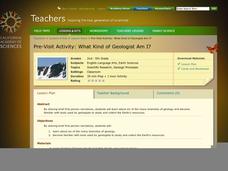Chicago Botanic Garden
Accessing Prior Knowledge: Global Climate Change Survey
Begin a unit on weather and climate change by assessing prior knowledge of the topic. Learners respond to a survey with questions that ask what they think causes climate change, the effects of climate change, and if it is important to...
SF Environment
Waste-Less Lunch
Is it possible to have a waste-less lunch? Can your class become leaders in conservation? Discuss the importance of reducing waste during lunch time with a fun lesson that can be extended to everyday practices. First the class examines...
Curated OER
Recognizing Litter
When does trash become litter? Use this litter awareness lesson to help them understand the importance of trash disposal. Get learners engaged by reading Nancy Loewen's Lady Lulu Liked to Litter (not included). After discussing what...
Pulitzer Center
The Global Water Crisis
High schoolers examine the "quiet crisis," the lack of clean water, by reading articles and viewing video clips. They discuss the situations in Ethiopia, Yemen, Kenya, and Nepal. There are two options for the lesson, but one of them...
WindWise Education
How Does Energy Affect Wildlife?
Is wildlife affected the same way by different electricity generation methods? Teams work together to research four electricity generation sources and their impacts on wildlife. The teams create a summary report and share their findings.
Chicago Botanic Garden
Personal Choices and the Planet
The last activity in the series of four has individuals determine steps they can take to reduce their carbon footprints and then analyze their schools' recycling programs. Through a sustainability audit, they identify how and where their...
Chicago Botanic Garden
Calculating Your Carbon Footprint
Unplugging from technology for one day per week will decrease your carbon footprint—are you up to the challenge? Part two in a series of three allows individuals to explore their personal carbon footprints. By first taking a quiz at home...
American Museum of Natural History
Keeping a Field Journal
Recording scientific evidence allows for important discoveries and conclusions. A remote learning resource outlines how to create a field journal to record scientific observations. The outline resource includes notation about the...
DocsTeach
Birth of the Environmental Protection Agency
Seeing is believing when it comes to climate change. An informative activity explores the creation of the Environmental Protection Agency (EPA) and its efforts to document environmental issues with photographs. Academics match images...
Curated OER
Wheel of Trouble
While teaching about endangered species, you can incorporate this activity as a take-home reminder of what is threatening the sea turtle population. It is one of those paper plate projects in which a wedge is cut out to reveal a picture...
K12 Reader
Adapting to Survive
Life science and language arts come together in a passage about animal adaptation. After kids learn about how organisms adapt to conditions in their environments, they complete five reading comprehension questions based on context clues...
Wild BC
Greenhouse Gas Guzzlers
Teams of six to eight players imagine that they are driving in a vehicle and collect balls that represent carbon dioxide emissions based on their different activities. "Greenhouse Gas Guzzler" cards tell teams how many balls to collect...
Habitat Conservation Trust Foundation
Greenhouse Gas Game
You will need to gather a number of tokens, bags, and other various game components in order to incorporate this activity into your curriculum. Different tokens represent carbon dioxide, methane, and nitrous oxide. Printable 8.5"x11"...
Marine Institute
Water Pollution
Sixth graders investigate the various types of pollutants found in water and ways to help prevent water pollution. Through a hands-on experiment, learners create samples of polluted water by mixing water with vegetable oil, dirt, and...
Intel
Beat the Heat
Explore greenhouse effect and climate change through a 15-day unit. Scholars learn about these STEM concepts by researching, conducting surveys, experimenting, and collaborating with experts in the field. They frequently communicate...
Chymist
Landfills and Recycling
Examine the nature of landfills through experimentation. Scholars build miniature landfills and monitor changes over a six-week period. Observations allow individuals to draw conclusions about the different types of trash and their...
Wilderness Classroom
Pollution
Educate scholars on pollution—air, water, and land—with a series of lessons that begin with a thorough explanation of each type. Learners then take part in three activities to reinforce the importance of reducing pollution. They...
It's About Time
Environmental Impacts and Energy Consumption
As scientists prove environmental impacts of using coal as an energy resource, do you think Santa regrets giving out so much of it? Through a demonstration of acid rain, pupils learn what makes it, where it occurs, the impact of it, and...
WindWise Education
What is Wind Power's Risk to Birds?
How is risk determined? Through the use of a reading passage, individuals or groups learn about bird interactions with man made structures along with wind turbines. Pupils use information from the second reading passage to conduct an...
WE Charity
High School–Module 3: Food Waste
Advances in packaging and refrigeration help keep food fresher longer. That's just one of the ways science is addressing global food waste. With the third of five lessons from the WE Are Innovators—High School Modules set, scholars use...
NOAA
Climate Is Our Friend…Isn’t It?: Make an Extinction Polyhedron
Climate affects populations in different ways. Scholars research extinct organisms and mass extinctions in part three of the 10-installment Discover Your Changing World series. They create graphic organizers, then fill in the information...
Curated OER
Acid Rain Effects
Get out the goggles and conduct a simple experiment to model and explore the harmful effects of acid rain (vinegar) on living (green leaf and eggshell) and non-living (paper clip) objects. Young chemists observe and describe the harmful...
Curated OER
Growing a Native American "Three Sisters" Garden
Young scholars explore plant life by creating their own gardens in class. For this food growing lesson, students discuss the types of gardening methods Native Americans used in order to keep healthy. Young scholars plant corn seeds in...
California Academy of Science
What Kind of Geologist Am I?
Transform your class into young geologists as they learn about six different branches of geology. Using the included geology career descriptions and picture cards, learners work in small groups deciding which tools and locations fit...
Other popular searches
- Environment Science
- Environmental Science
- Environmental Science Games
- Environmental Science Unit
- Ap Environmental Science
- Living Environment Science
- Environmental Science Energy
- Environmental Science Maps
- Environment Science Labs
- Land Use Environment Science
- Environment Science Dilemma
- Environment Science Graphing



